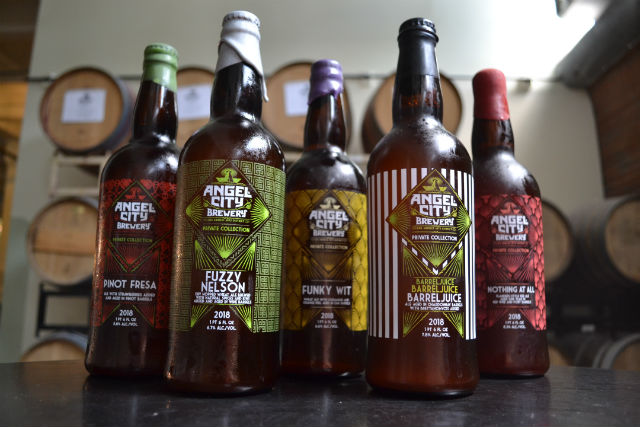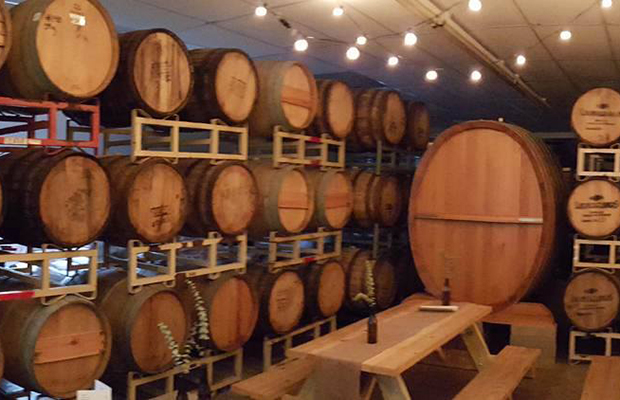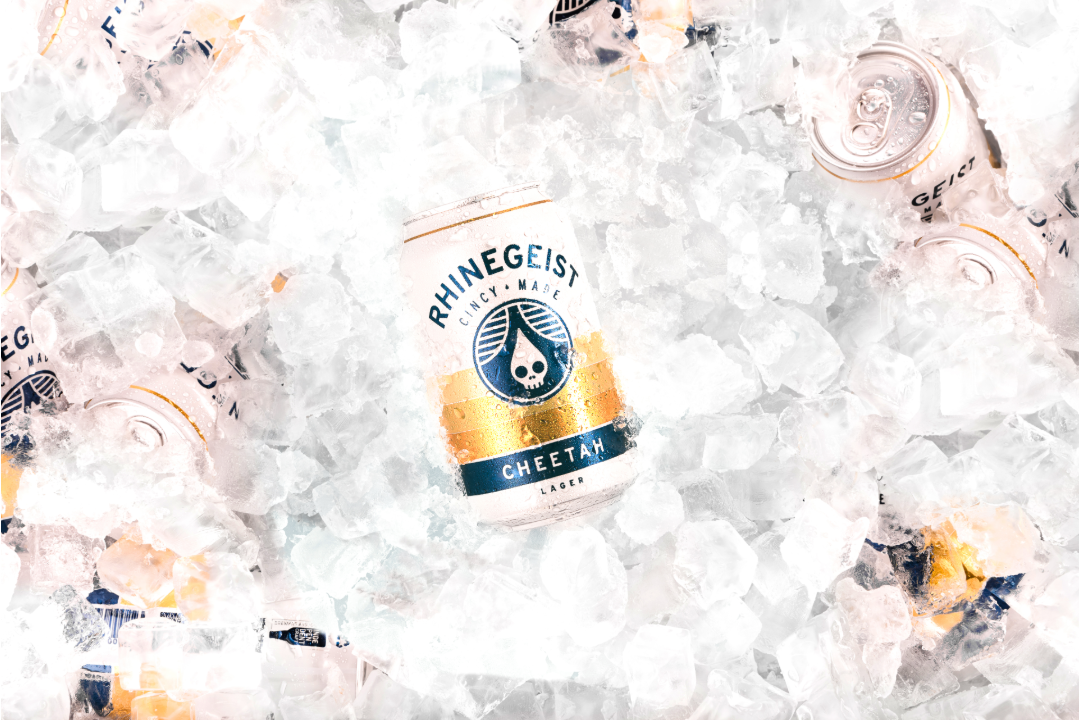
Kellan Bartosch isn’t simply ticking off states just to say Wiseacre sells beer there.
“We want to find good distributor partners, and obviously we want to keep trying to grow just like everybody else,” said the co-founder of the Memphis-based brewery, which was founded in 2013 by brothers Kellan and Davin.
Focusing inward, solidifying management, building on a popular brand, and understanding their numbers better have been key for the brewery as it now extends across into 22 states, led by its biggest volume player in “Tiny Bomb Pilsner”.
“Davin really wanted to make a Pilsner,” Kellan said. “We didn’t see that becoming our best-selling beer and really leading the way for us.
“That’s been probably the best surprise because you can’t plan for lightning in a bottle like that.”
Tiny Bomb is actually one of the top independently owned canned craft beers sold in the country now with nearly 50% of the brewery’s almost 27,000 barrels of production dedicated to its creation each year.
“It started as a smaller portion of our sales,” Davin pointed out. “Ananda, our IPA, was the early leader, for sure. But every year we’ve made more Tiny Bomb than the year before.”
Both brothers had beer experience before launching the brewery back home in Memphis with Kellan handling sales for Sierra Nevada on the West Coast while Davin brewed for Rock Bottom in Chicago. They used that previous experience to craft a company that was built for growth. They saw that happen with enough growth in its first six years to have them look to create a larger production facility to get past 20,000 barrels and expand throughout Tennessee and surrounding markets. Ohio was the newest state launched in February of 2024.
It was Tiny Bomb that made the brewery stick out, Kellan said. Winning a medal at the 2014 Great American Beer Festival, the brewery propelled that with what at the time was a “unique” beer … an easy-drinking Lager versus the IPA-heavy breweries.
“When we launched in New Orleans, it was the first time it really made sense that Tiny Bomb helped us stick out in a really big way,” Kellan said. “With IPAs, you are competing with locals everywhere. That’s the biggest part of our whole craft beer category is hoppy beer, so we got to stick out in a really unique way with an amazing beer.
“It’s all this kind of stuff that was the lightbulb moment for Tiny Bomb, the medal plus New Orleans.”
Wiseacre is creating in-roads to even the non-craftcentric drinker.
When Wiseacre opened, there was a lot of IPA, Barleywine, and Imperial Stouts — extreme beer — being touted by craft-centric fans.
“Everything is like $24 four-packs and I think people are kind of tired of that,” Kellan said. “We talk about food a lot because people don’t eat extreme food all the time. You don’t eat ghost pepper wings every night for dinner, or foie gras … something super rich.
“For beer, Tiny Bomb is a beer-flavored beer. It’s like the pizza or chicken tenders of beer, a really good Pilsner that’s something normal and that’s really good. And that’s what Tiny Bomb is. I think the pendulum is swinging back from extreme beer on the consumer level, and Tiny Bomb is right there.”
Tiny Bomb was built on Davin talking to people in the taproom of Rock Bottom.
“I was always hearing people drinking Bud Light, Miller Lite, Coors Light and it being kind of frustrating because I felt like I worked a lot harder and felt the beers that we were making deserved more attention,” he said.
But whenever he heard that, he would ask why are you drinking this?
“It’s never because it tastes really good. It’s always like, I can drink five of them and not be messed up, or it has lower calories, it’s light and drinkable,” Davin said. “So the idea with Tiny Bomb was to make something that hit all the specs of Bud Light, about 125 calories, 4.5% alcohol, and super crushable. But we wanted something that had a lot of flavor as well. All of those things are the reasons why we made the beer. There’s even a little bit of honey as well, which is what helps it dry out a lot that makes it really drinkable, but still keeps the ABV low.”
Most recently, the brewery introduced Sky Dog, a 90-calorie light American Lager. The brand will be priced one dollar below what Tiny Bomb and other craft brand will be priced to be more in line with that mid-tier “Premium” level of pricing.

To close out 2023 and welcome in “Dry January,” the brewery debuted Hop Zip, a hop-infused sparkling water.
“It’s our first N/A,” Kellan said. “Hop waters are new for us and we actually added a little lime flavoring — which seems odd — but hops can be overpowering without some sort of malt sweetness, so it helps mask some of that vegetal hop taste and some hop bitterness that malt would cover over.
“We have shipped that out to Colorado, San Diego and statewide in Tenneess. The first two runs went so well we are going to be doing more of it.
“When you smell it feels like you are holding an N/A beer. There are a lot of N/A products that have a ways to go, but we are pleased with how this is going.”
Of course, the business plan was for growth and Davin quipped that he was more than prepared to be running a small brewery in Memphis and tending the bar on his own when he was 50 years old.
“Obviously with growth and all of that, comes change,” he said. “You get people that are better at a lot of the things than you were and it makes the business and the company better than it would have been otherwise.”
That has been pivotal as they announced longtime employee Amanda Thompson as the brewery’s COO in early 2023 along with hiring Blake Edwards as Controller in March of 2022.
“He really came in at such a good time with our costs growing the way that they were,” Kellan said. “We hired him — not because we knew that was happening — but it’s helping us be smarter about our business. So I think that’s a good thing. It hasn’t been the way that we started our business, but good things are happening there.”
READ MORE: As Wiseacre Grows, Thompson Assumes Role as COO
Thompson began at the brewery in the taproom and worked her way up from the taproom to administration, events, human resources, and operations to the point where they knew she needed to be officially named COO of the company.
“Amanda is amazing,” Kellan said. “I feel like we’re just very risk tolerant and we’ll just like jump off a cliff and try to figure it out later. So Amanda’s probably more aware of challenges maybe than we are. No one’s more deserving of the position she’s in, not only is her great work ethic and value-added everywhere, but she’s a leader at our company, and she’s fun to work with.
“It can be challenging to work with us. We’re brothers, we kind of speak in code at times on purpose. But she’s really found a way to engage with people and do the job well and have fun with us. We need someone like her. We have limited skill sets, and we have somebody here who’s great at a lot of things that we’re maybe not great at.”
Thompson said that the Bartoschs are the big-picture players at the brewery while her transition as a COO is to try to think from the broader details.
“I stay stuck in the details a lot of times,” she said. “I’m really good at asking all the questions to the point that I think I can drive people a little bit crazy, but it’s that counterbalance in the willingness to jump off the cliff.”
Opening the production facility in the spring of 2020 as the pandemic hit stifled the brewery, like most in the country, and changes to the bottom line happened everywhere.
“The first seven years we were doing kind of the way we wanted to do it,” Kellan said. “The numbers were working and we were seeing good results. We didn’t have to spend time worrying about it. But with the cost increases, it’s a necessity to think about it and use it as you plan and shift where you focus — like managing inventory for cash flow, which Amanda does a ton of.
“On the can side, we have nine year-round beers. Just for Tiny Bomb, we’ve got 12-ounce cans/six packs, we have 12 packs, we have 16-ounce cans and a 24-pack. We have 19.2-ounce cans also so that alone has all these different boxes … how do we order that so efficiently? So coming up with plans to manage everything better, really impacts our business in a way that it didn’t as much before.”
Getting to know your brewery’s numbers doesn’t have to be an “Oh, crap” situation, Thompson said.
“It can also be a source of hope and confidence for our people to be able to act more decisively and to understand the numbers that relate to their distinct roles and what they’re doing,” she said. “We can start to make wishlist items now that we want in the future for the things we want to grow towards.
“For me, at least, it has created a lot more optimism … to see where we’re going and what the path can be to get there instead of just operating a sense of okay, we’re doing pretty well. But can I spend what I want to on this project? What’s it going to take to be able to get to the point that I can?”
The most important key to the brewery’s growth is having really good distributor partners.
“We have an awesome sales team and a great key accounts manager,” Kellan said. “We have people that travel and that love our company, but also we’re spread out … and we’ve got a lot to do so we have distributor partners and when they really love Lager — and it doesn’t have to be Wiseacre Tiny Bomb — but when they tell us that they’re excited about Lager, that’s a good sign for us.
“Then, our sales team are a lot of rockstars. They love our brand, but they know how to sell, it’s not like they’re just out there having fun drinking beer. They know how to go and talk to every tier of our industry, how to manage growth and build towards it.”






Be the first to comment